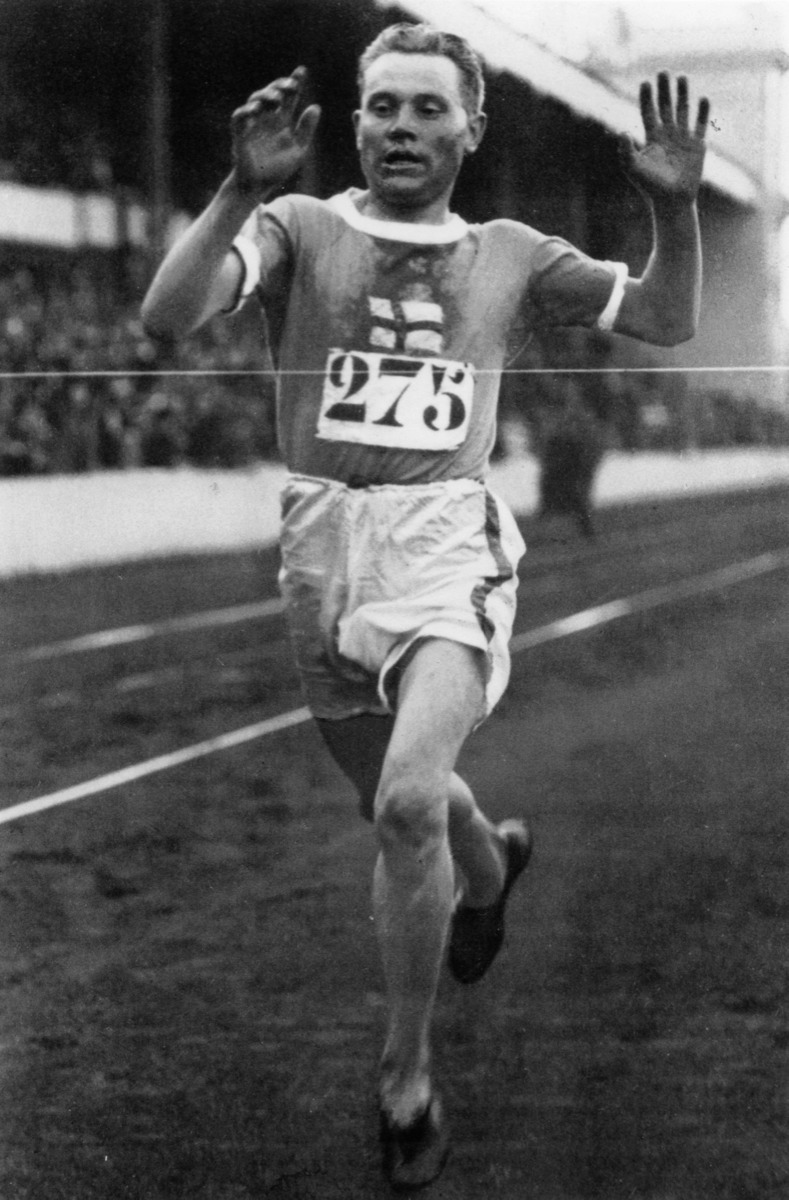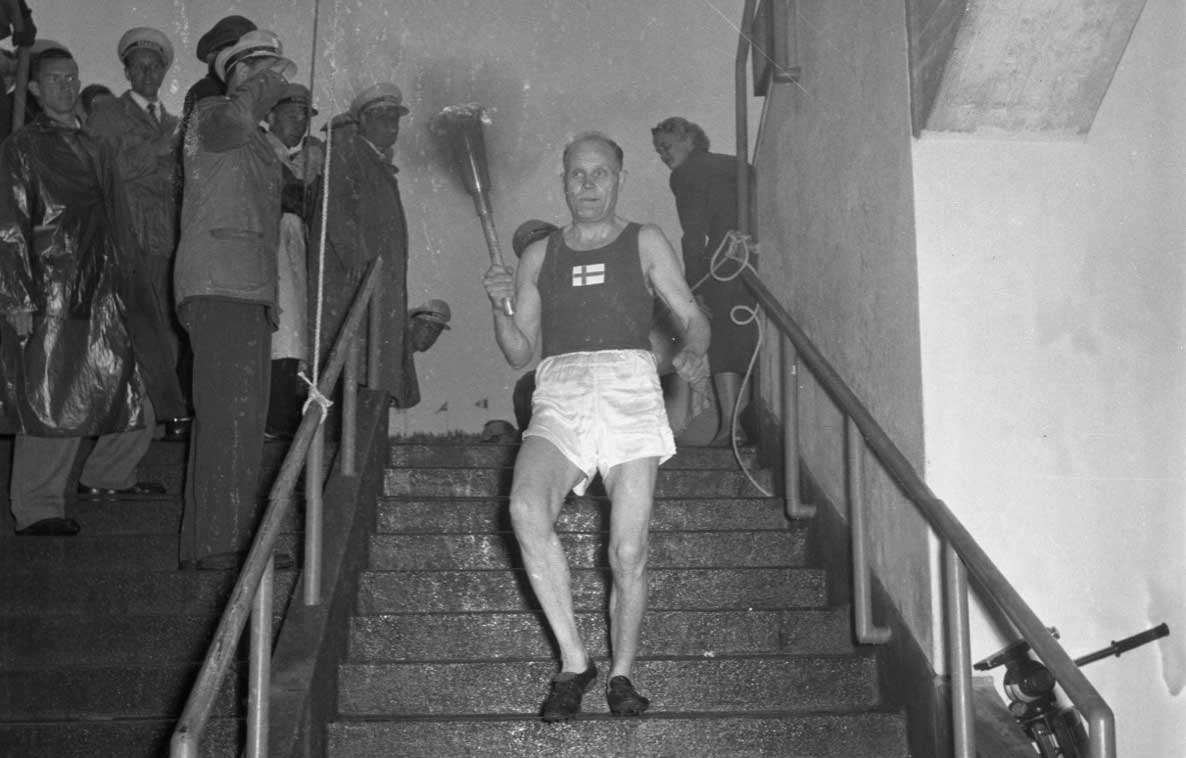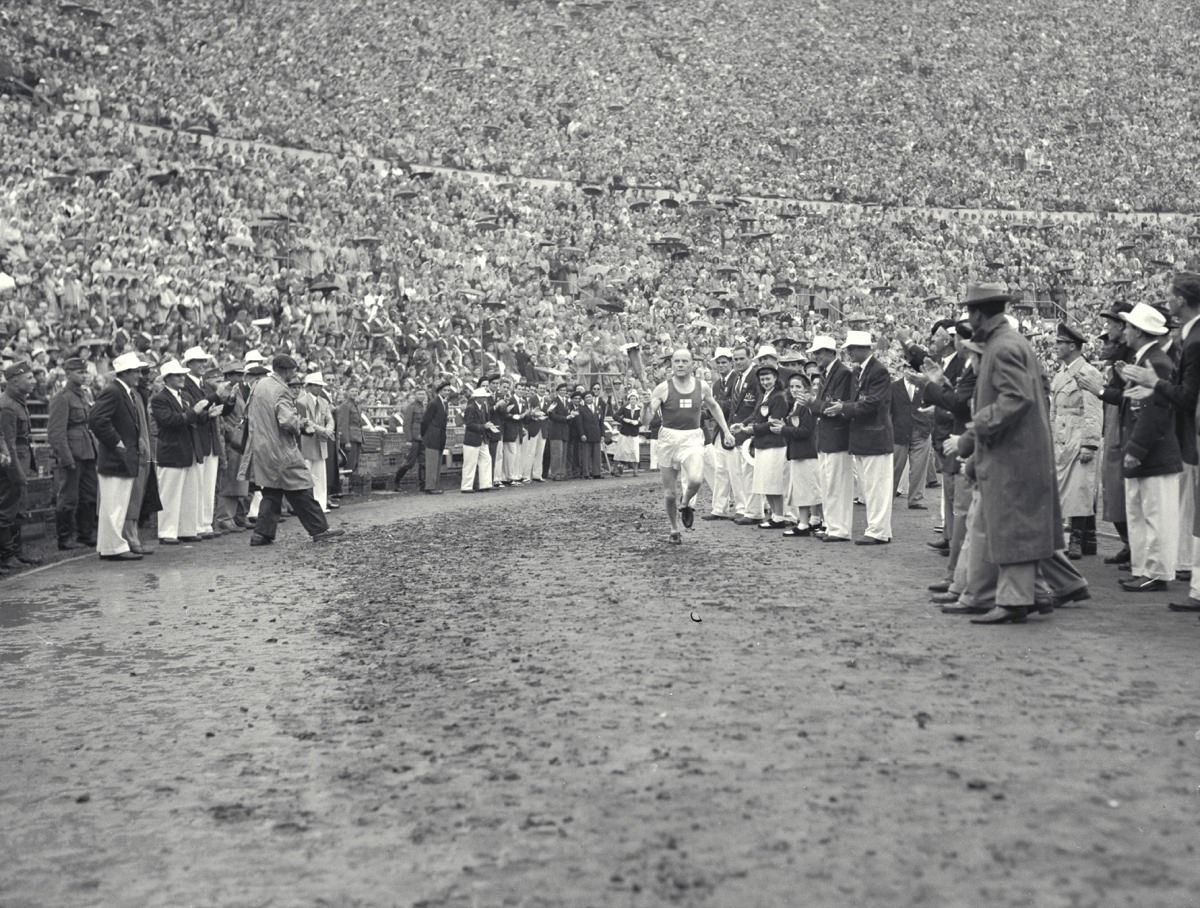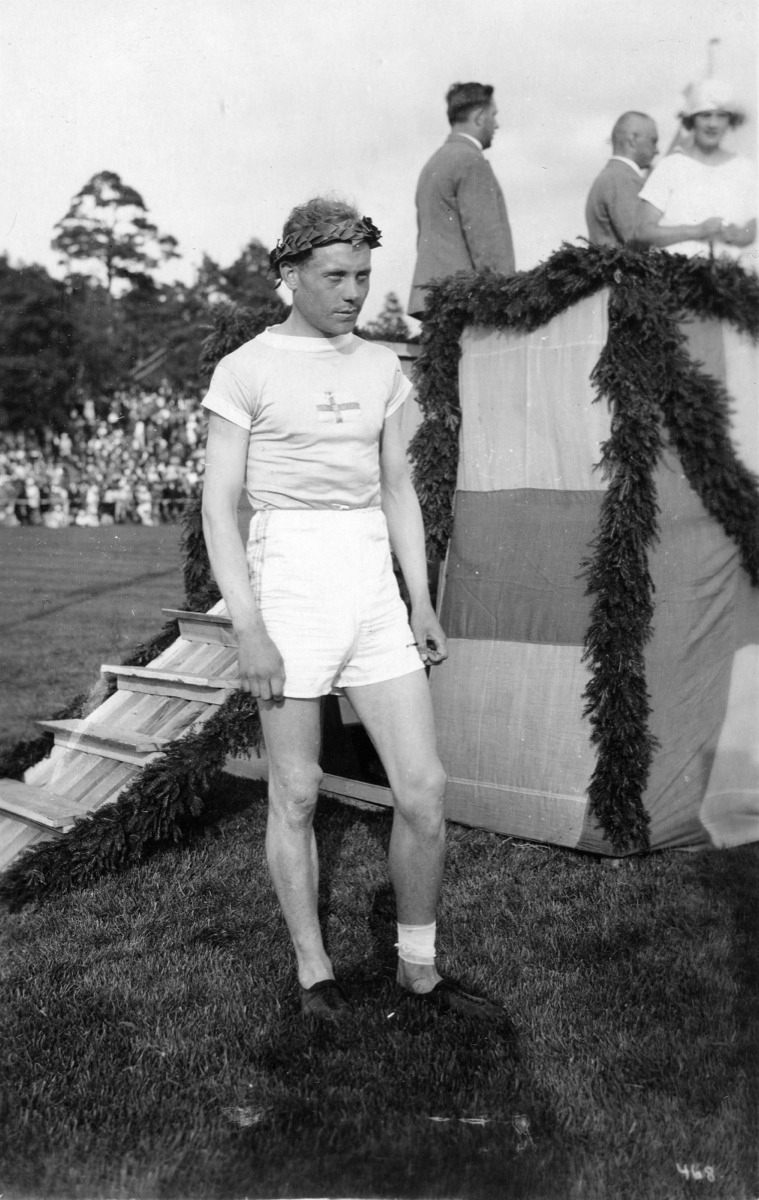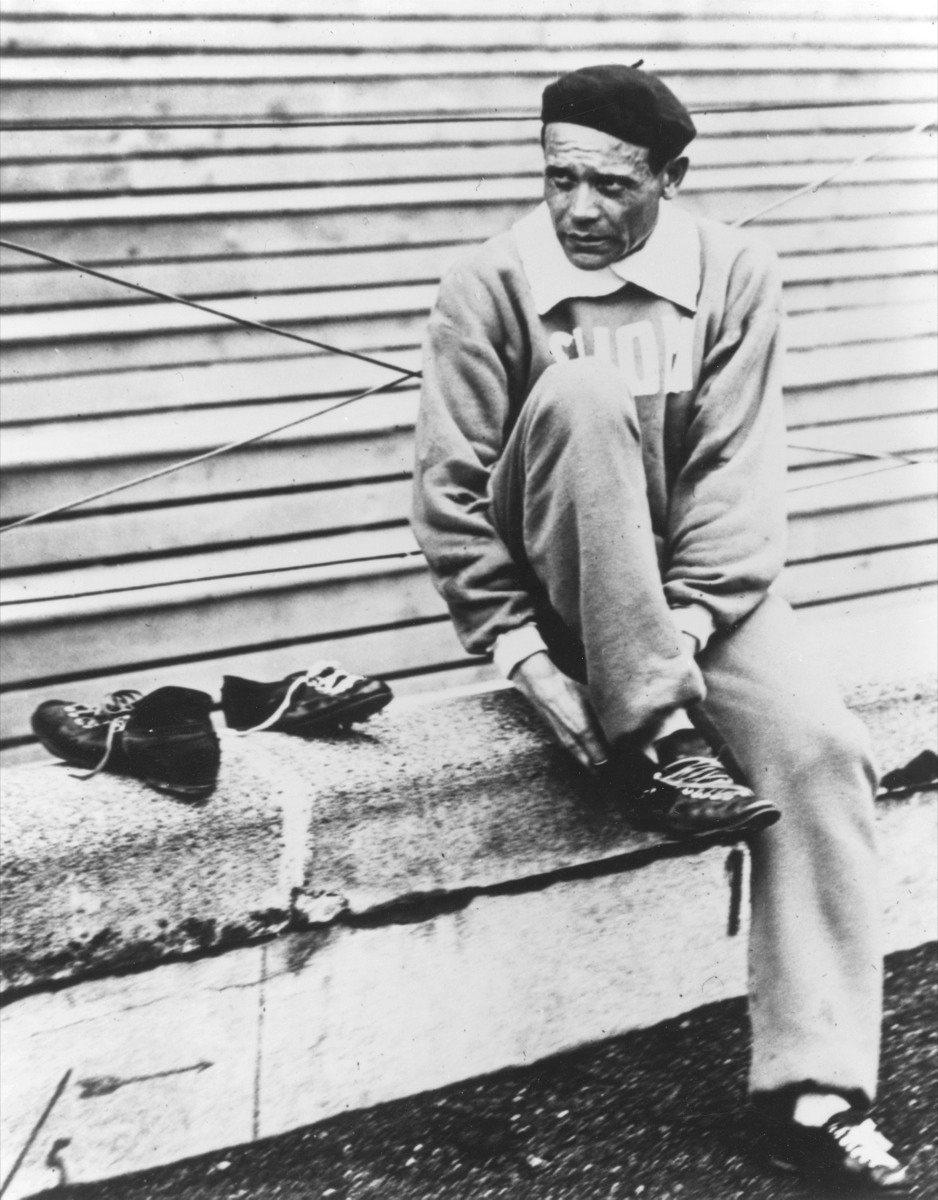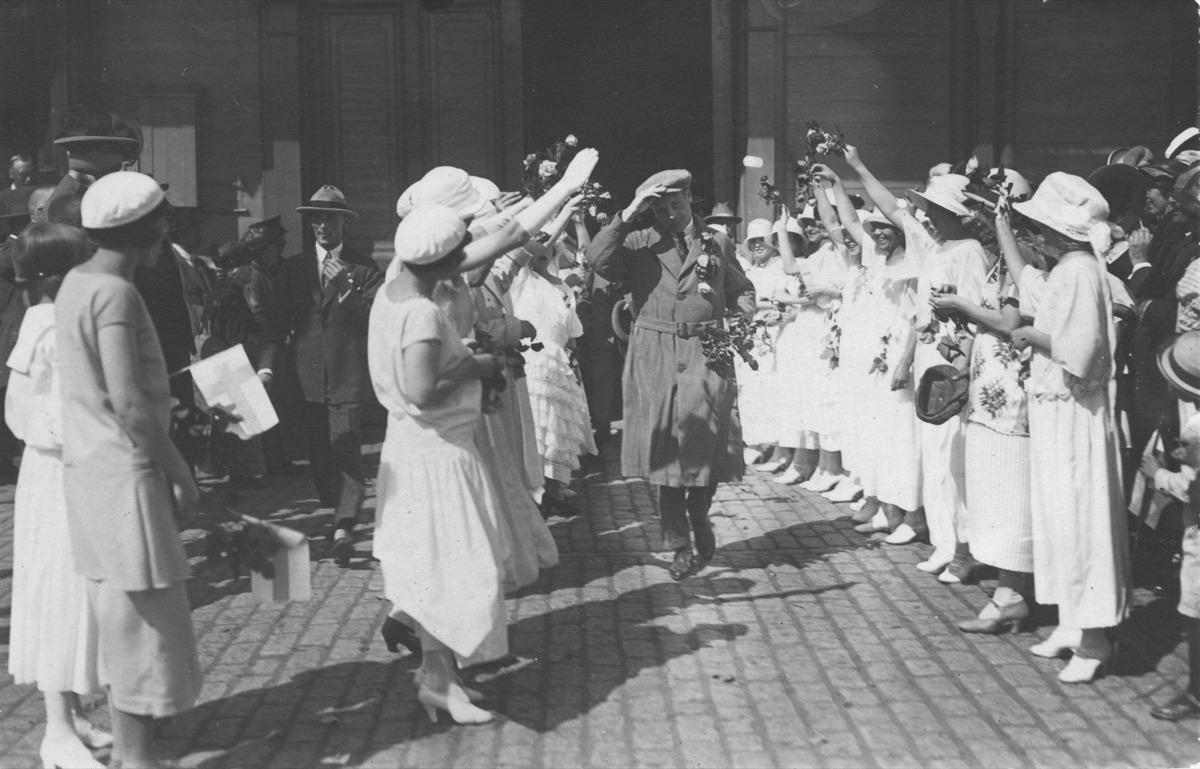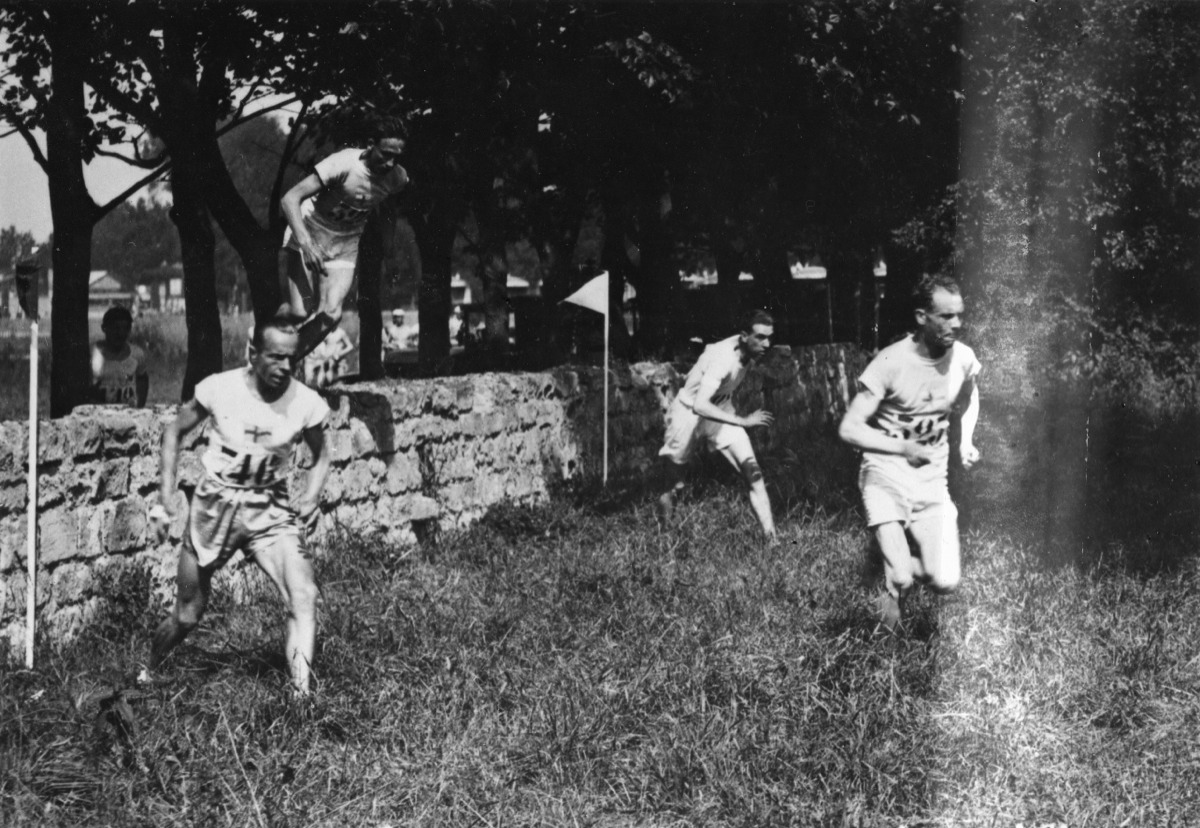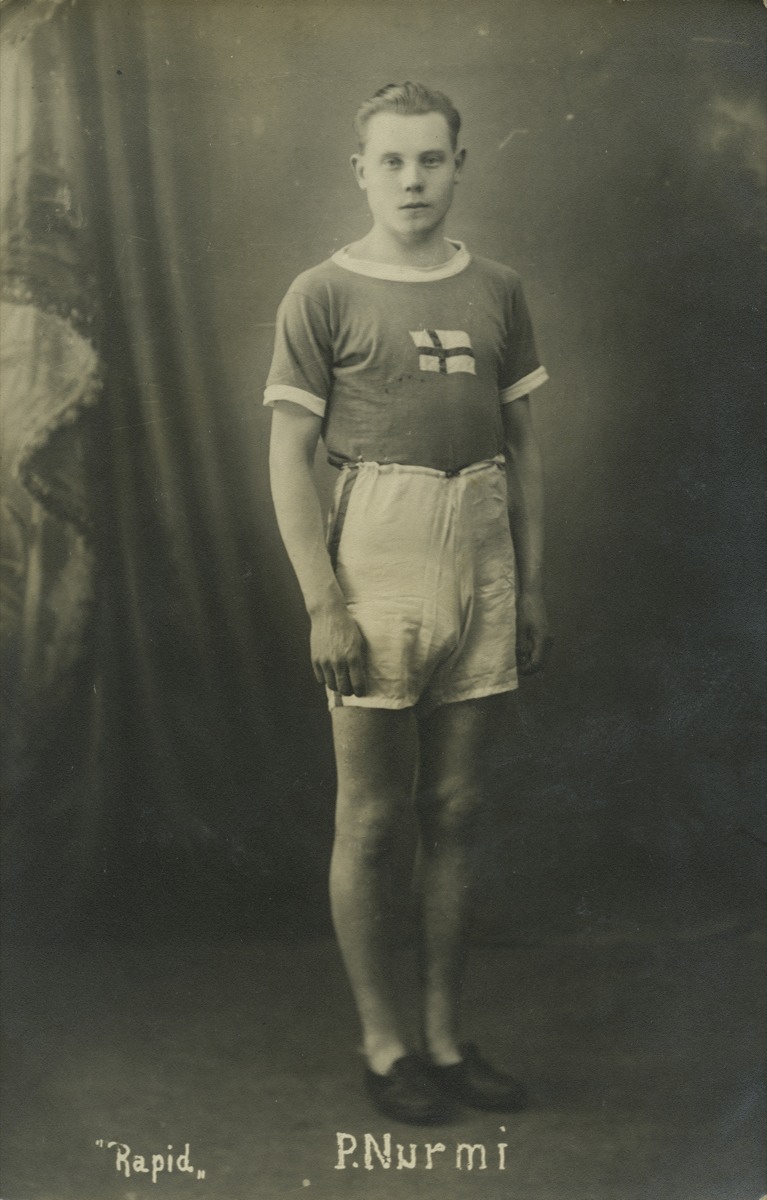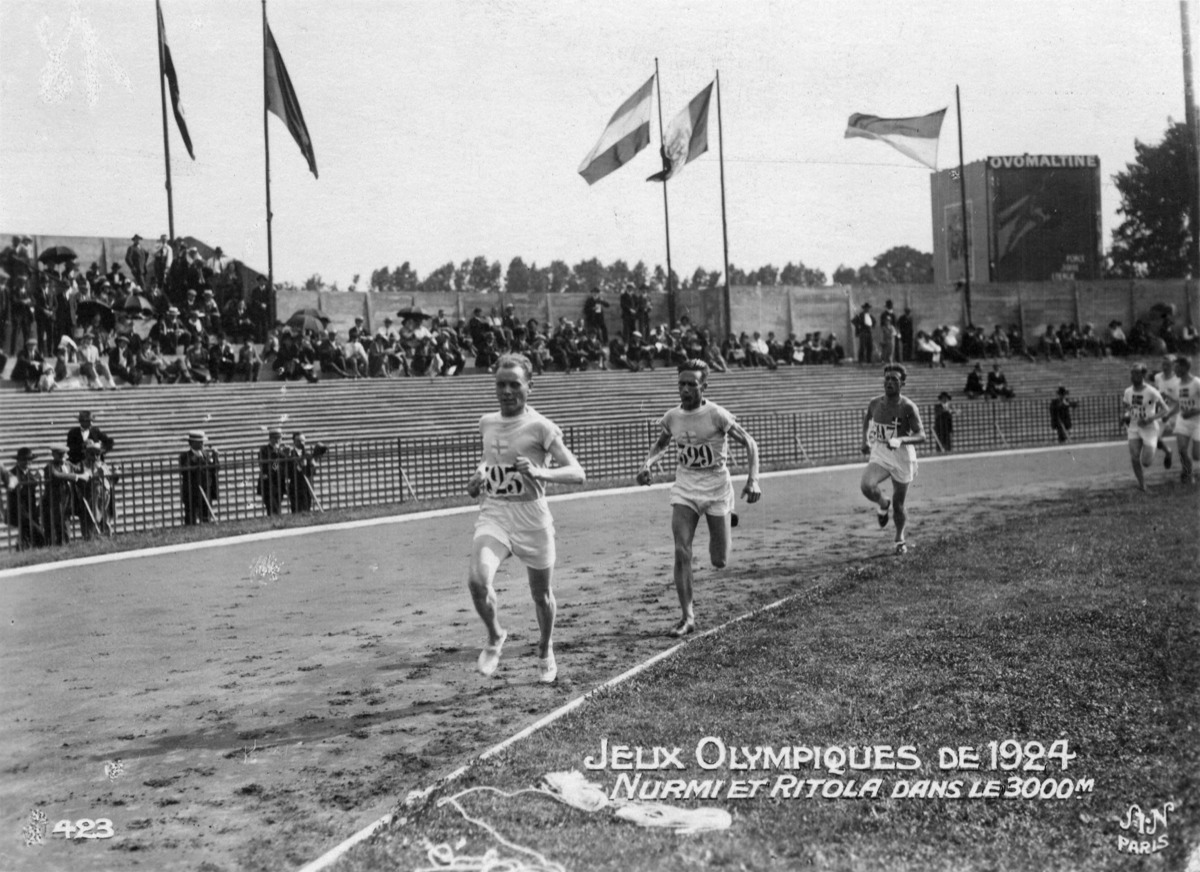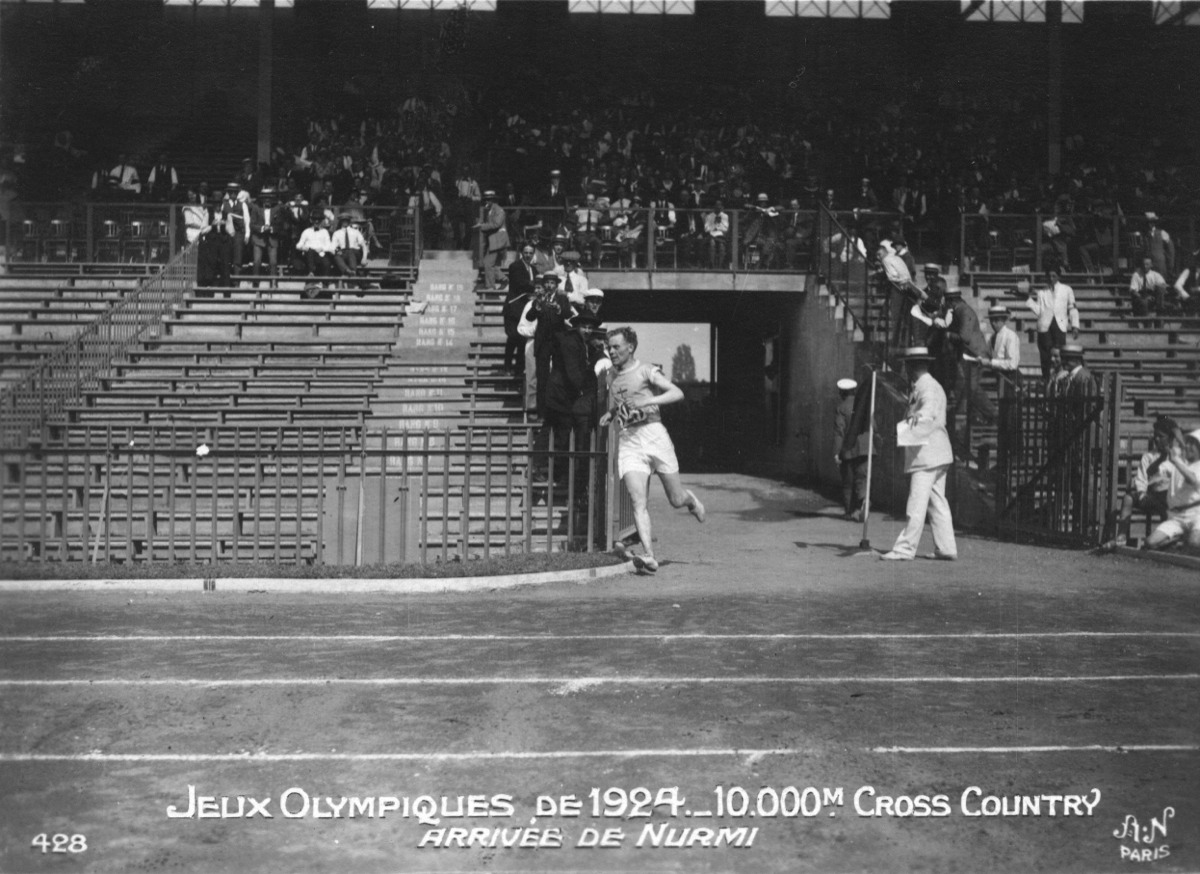PAAVO NURMI AT THE OLYMPIC GAMES
ANTWERP 1920
Monday, August 16th 5000 metres, Qualifying Heat
Paavo Nurmi makes his first Olympic appearance in a relaxed manner. Four runners will qualify for the final, and Nurmi just observes the situation calmly, making only casual visits to the front of the pack. In the final stretch he sprints effortlessly to second place five seconds behind Carlo Speroni of Italy and qualifies with ease.
Tuesday, August 17th 5000 metres Final:
The final of the 5000 metres starts at 3.15 pm. The heat is intense. Nurmi has devised a bold strategy in order to exhaust the dangerous Swedes Eric Backman and Runar Falk in the first part of the course. After three laps Nurmi overtakes Speroni to take the lead and build more speed. Only the 20-year-old Frenchman Joseph Guillemot is able to follow him. The 3000-metre mark is passed two seconds faster than fellow Finn Hannes Kolehmainen did in his world record run at the Stockholm Olympic Games in 1912. Guillemot still refuses to yield, however, and Nurmi begins to lose heart. On the final curve the Frenchman moved to pass Nurmi on the outside. Unaccustomed to final stretch sprinting, Nurmi gives up completely and jogs to the finish line four seconds after the winner has broken the tape.
Thursday, August 19th 10 000 metres, Qualifying Heat
Nurmi’s only target in this race is to place with least possible effort among the five finalists. He succeeds in this by finishing in second place sixty metres behind the Scot James Wilson. The heat is the slowest of the qualifying competition.
Friday, August 20th 10 000 metres Final: GOLD MEDAL
The race is put forward a couple of hours at the request of the King of Belgium. The defeat in the 5000 metres still burning in his mind, Paavo Nurmi has a new game plan. He runs up front in the first kilometres but then drops behind to stalk the fastest man of the qualifying heats, his fellow countryman Heikki Liimatainen. The latter is already worn out, however, and Nurmi sees the error of his strategy just in time. Together with Augusto Maccario of Italy Nurmi begins to close the gap to the leading duo, Joseph Guillemot and James Wilson. One kilometre to go Nurmi is back in the leading group. Entering the last lap, only Guillemot is left to fight with him. Nurmi now lets the Frenchman taste his own medicine. He slows down in the backstretch and allows Guillemot to take the lead – but then sweeps past him on the final curve and takes his first Olympic victory by a margin of seven or eight metres. Nurmi’s time of 31:45.8 is over a minute faster than his former personal best. Guillemot, who had eaten a substantial lunch just before the race unaware of the change of schedule, vomits on Nurmi’s shoes. Nurmi celebrates his first Olympic title in a way soon to be familiar: he simply leaves the arena showing no signs of emotion.
Monday, August 23rd Cross-country race, Individual: GOLD MEDAL – Team competition: GOLD MEDAL
The cross-country race is the last event in the Olympic track and field program. In the previous day Hannes Kolehmainen has won the gold medal in the marathon race. Most athletes are already packing their bags. The fight for points between nations is still going on, however, and with two sets of medals to be won, the Finnish team is under orders to take no prisoners. 51 men start the race on a cold and cloudy day. The course is eight kilometres and relatively flat. From the beginning the leading group contains all three favourites: Paavo Nurmi, Joseph Guillemot and Eric Backman of Sweden. Nurmi is now full of self-confidence and one by one others fall behind. Three kilometres to go Guillemot pulls aside having apparently injured his leg. Closing the Stadium, Nurmi has a 50-metre lead on Backman, but then allows the Swede to catch him. Backman enters the Stadium ahead, but 200 metres before the goal line Nurmi finishes him off with an easy sprint. Heikki Liimatainen takes the bronze medal, and when Teodor Koskenniemi crosses the goal line in sixth place Finland wins the team competition as well with 10 points, well ahead of Great Britain with 21 points and Sweden with 23.
PARIS 1924
Tuesday, July 8th 5000 metres, Qualifying Heat
Paavo Nurmi has a relaxed start in his second Olympic campaign. He spends the early kilometres behind the main pack, chatting with team-mate Eino Seppälä. When the audience starts to whistle at his lazy performance, Nurmi picks up pace, takes the lead and wins the heat. His time is one minute slower than his world record mark set in June.
Wednesday, July 9th 1500 metres, Qualifying Heat
Nurmi uses the qualifying heat to test his speed and finds it quite adequate. A fast first lap leaves the others far behind, and Nurmi only needs to coast to finish as winner.
Thursday, July 10th 1500 metres Final: GOLD MEDAL
Paris is caught by a heatwave on Paavo Nurmi’s greatest day. The Olympic finals in 1500 and 5000 metres were originally scheduled to take place inside an hour. On 19 June in Helsinki Nurmi had tested this Olympic schedule and broken world records in both distances. Now he aims to win the 1500 metres without exerting himself too much. Nurmi takes the lead after 200 metres and builds up a blistering speed. He passes the 800-metre mark almost three seconds sooner than in his world record race. Only Ray Watson of the United States tries to keep up with Nurmi but he too gives up before the last lap. With 300 metres to go Nurmi remembers to relax, slows down visibly and coasts to victory. His winning time of 3:53.6 is still only a second slower than his world record. In the end the rest of the pack, fighting fiercely for the silver, narrows the gap to about twenty metres. Watson pays dearly for his folly and fades to seventh place. Nurmi is already preparing for the 5000 metres.
Thursday, July 10th 5000 metres Final: GOLD MEDAL
The original schedule has been relaxed by placing qualifying heats in 400 metres between the two finals. The 5000-metre final still starts less than two hours after Paavo Nurmi’s victory in the 1500 metres. What is more, Nurmi now has a serious competitor. His countryman Ville Ritola has already won two gold medals, in the 10 000 metres on Sunday – with a new world record – and in the 3000 metres steeplechase on Wednesday. This is the first time Nurmi and Ritola meet in an Olympic race: in allocating races between their two stars the Finnish team officials had prevented Nurmi from taking part in the 10 000 metres. Sweden’s Edvin Wide, who was also born in Finland, tries to shed his former countrymen by building up early speed. Ritola trails him closely with Nurmi following a bit further down the field. Wide keeps up world record pace for 2000 metres but then begins to fade. At half-way mark Nurmi takes the lead and is followed by Ritola. Wide falls behind, and the rest of the race is a duel between the two Finns. Nurmi leads by seven metres at best, but Ritola closes the gap before the last lap. In the home stretch Ritola makes his move from the outside, but Nurmi answers with a calm change of pace and breaks the tape in 14:31.2, one metre ahead of his rival.
Friday, July 11th 3000 metres Team Race, Qualifying Heat
From every nation six men enter the race: the placings of the best three are added together to make the team score. Finland’s opponents in the qualifying heat are Great Britain, Italy, Poland and Norway. As expected, Paavo Nurmi and Ville Ritola outclass the rest of the field. In the final stretch they even wait for the third Finn, Sameli Tala. The trio crosses the goal line at a leisurely pace, Nurmi duly getting the honour to break the tape.
Saturday, July 12th Cross-country race, Individual: GOLD MEDAL, Team competition: GOLD MEDAL
The Olympic cross-country race takes place on the hottest day of the Parisian summer. The temperature rises to 45 degrees Centigrade in the sun, and shade is nowhere to be found along the course. The competitors have to negotiate 10 650 metres of dusty tracks along the bank of the Seine amidst thick weeds and noxious fumes from a nearby energy plant. Of 38 entrants only 15 make it to the finish, and of these, eight are carried away on stretchers. Edvin Wide starts again fastest, trailed by Paavo Nurmi and Ville Ritola. After 4.5 kilometres the Finns leave Wide behind, and the Swede never sees the goal line. A couple of kilometres later Nurmi makes his move and towards the end his lead only increases. Nurmi crosses the finish line a minute and a half ahead of Ritola and looks only slightly tired. The gold medal in the team competition proves to be a much harder case. For a while it seems that no third Finn has made the journey home. Then Heikki Liimatainen, staggers semi-consciously into the Stadium and after dramatic interludes crosses the finish line in twelfth place. Only three teams get three men through: Finland wins with 11 points, the USA is second with 14, and France third with 20 points.
Sunday, July 13th 3000 metres Team Race Final: GOLD MEDAL
Many other cross-country racers are still recovering in hospital when Paavo Nurmi and Ville Ritola start for another Olympic final. Finland’s opponents for the 3000-meter team title are the United States, Great Britain and France. Nurmi takes the lead after the first kilometre and never looks back. Only the American Joie Ray dares to trail the champion but only manages to exhaust himself totally. Ritola leads the rest of the pack before he, too, leaves it behind at the beginning of the final lap. Nurmi’s winning time is 8:32.0, and Ritola comes second, 8.6 seconds behind. When Elias Katz crosses the finish line in fifth place, Finland’s total score is eight points. Britain takes the silver with 14 points and the bronze goes to the Americans with 25. This completes Paavo Nurmi’s Olympic campaign in Paris: in six days, he has run seven races, won them all and gathered five gold medals. Ville Ritola also has an impressive tally: four gold and two silver medals in eight races in eight days.
AMSTERDAM 1928
Sunday July 29th 10 000 metres Final: GOLD MEDAL
The Olympic 10 000-metre final takes place on the opening day of the track and field competitions. There were no qualifying heats. Joie Ray of the United States is the first pace-setter; Paavo Nurmi and Ville Ritola both keep their heads. After 1500 metres Ritola moves up front and is followed by Nurmi and Edvin Wide. At the half-way point these three have already developed a hundred-meter lead to the others. After 6500 metres Wide falls behind, and the rest of the race is once more a duel between Nurmi and Ritola. Ritola leads all the time, but Nurmi keeps close with ease. Coming to the home stretch Nurmi makes his move from the outside. Ritola tries to answer, but Nurmi’s sprint is faster. Nurmi reaches the goal line 2.5 meters ahead of Ritola. 45 seconds later Wide finishes for the bronze medal. Nurmi’s time of 30.18,8 is twelve seconds slower than his own world record.
Tuesday July 31st 5000 metres, Qualifying Heat
Four fastest runners qualify for the final, and Paavo Nurmi only wants spare his strength. After 3000 metres a leading group of four is already clear. Macauley Smith of the USA is allowed to win the race, with Edvin Wide finishing second. Nurmi is pipped at the goal line by Britain’s Herbert Johnston as well and finishes in fourth place, which actually is his worst Olympic result. Behind Nurmi, Kohn of Germany takes a fierce final sprint and finishes within three metres of the champion.
Wednesday August 1st 3000 meters Steeplechase, Qualifying Heat
Nurmi did not qualify for the Finnish team in the 1500 metres, and the cross-country race has been removed from the Olympic program. Instead, Nurmi decides to enter the steeplechase even though he has tried the event only twice in his life. The first water jump of the heat proves almost fatal. Nurmi’s spike cuts into the wooden hurdle, he spins, falls on his back into the deepest part of the water pool and sprains his hip and foot. Lucien Duquesne of France stops to help Nurmi up. In gratitude Nurmi then paces the Frenchman past the rest of the field. In the final stretch Nurmi offers to let him win the heat, but Duquesne gracefully refuses and crosses the goal line behind the champion.
Friday August 3rd 5000 metres Final: SILVER MEDAL
Both Finnish favourites carry injuries from the steeplechase heats. Paavo Nurmi’s left hip is almost numb and Ville Ritola has sprained his ankle. After two laps Nurmi moves up front and Ritola follows, clearly in pain. Nurmi’s pace causes no problems for the rest of the field, however, and at half-way point Ritola takes the lead and picks up speed with a painful grin. One kilometre to go, Edvin Wide and Leo Lermond of the United States still trail Ritola and Nurmi, but when Ritola makes his move 600 metres from the finish, only Nurmi follows. Everyone now expect another sprint victory for Nurmi. Coming to the final stretch, Nurmi duly launches his attack. But Ritola develops a fierce sprint and to general surprise pulls away to victory. In the final metres Nurmi even has to fight for the silver, barely beating Wide by a metre. After the race Nurmi sits on the grass for a long time nursing his sore hip. Never before has he looked so tired.
Saturday August 4th 3000 metres Steeplechase Final: SILVER MEDAL
Paavo Nurmi and Ville Ritola start with no great expectations: both are worn by their injuries and the gruelling 5000-meter-race of the previous day. Nurmi, still in pain, has trouble negotiating the hurdles but picks up pace between them. Finns have a well-planned team strategy for the race. After 2000 metres Toivo Loukola, their leading steeplechase specialist, makes an attack and develops a 30-meter gap to the rest of the field which is led by Nurmi. The French and the Americans keep monitoring Nurmi who makes no move to catch Loukola. Quite the opposite, Nurmi keeps the pace down and just concentrates on fending off foreign opposition, thus giving his countryman a safe passage to gold medal. In the final lap Nurmi then leaves the pack behind, and when Ove Andersen does the same in the home stretch, Finland sweeps all three medals. Loukola’s winning time is a new unofficial world record. Nurmi loses nine seconds to him, but his time of 9:30.8 is also better than the previous world best mark.


